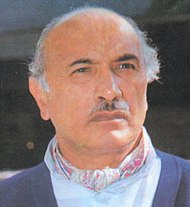
Back أصغر خان Arabic আসগর খান Bengali/Bangla اصغر خان PNB اصغر خان Sindhi Asghar Khan SIMPLE اصغر خان Urdu 阿斯加尔·汗 Chinese
This article may need to be rewritten to comply with Wikipedia's quality standards. (August 2020) |
Air Marshal Muhammad Asghar Khan (Retd.) (Urdu: اصغر خان 17 January 1921 – 5 January 2018), was a Pakistani politician and an autobiographer, later a dissident serving the cause of pacifism, peace, and human rights.[3]
Born into a military family, Asghar Khan briefly served as an officer in the Indian Army before being deputed to the Royal Indian Air Force (IAF) as a military adviser in 1941— he was later drafted into the IAF as its commanding officer on the Asian front of World War II.[4] After the Partition of India In 1947, Khan chose to join the Pakistan Air Force (PAF) and later secured promotion as a three star rank air officer when he was appointed in 1957 as Commander-in-chief to command the PAF at the age of 36 – the youngest officer at the command level in the Pakistani military at that time. In 1965, his dissent with General Musa Khan, the Army Commander in Chief, over the Operation Gibraltar area contingency plans, and vetoing decisions to go on the Indo-Pakistani War of 1965, eventually led to his replacement with Air Marshal Malik Nur Khan.[3] Asghar Khan continued to serve with his rank when he was deputed as a Pakistan International Airlines's executive, until retiring in 1968.[2]
After his retirement from the military in 1968, Asghar Khan founded the Tehrik-e-Istiqlal (Solidarity Party) with a secular and centrist political program in direct opposition to the Pakistan Peoples Party (PPP) and the Pakistan Muslim League (PML), but failed to make any significant impact in the 1970 Pakistani general elections. From the 1970s–90s, Khan's political career focused towards the 'Dharna' or 'politics of agitation', against the elected civilian governments, and gained notability when he filed multiple lawsuits, over the Mehrangate bank scandal, against the PPP and the PML(N) at the Supreme Court of Pakistan in the 1990s.[5] During this time, Khan authored many political books, some very critical or given dissenting criticism of the Pakistan Army's involvement in national politics.[6][7]
In 2011, Khan merged his party with the Pakistan Tehreek-e-Insaf (Pakistan Movement for Justice).[8] Khan died in January 2018 and was buried with full state honours.[9]
- ^ Khan, Mohammad Asghar (1969). Pakistan at the cross-roads. Ferozsons. Retrieved 11 April 2018.
- ^ a b Naseeruddin., G. (1968). Trade and Industry.
- ^ a b Naveed Siddiqui, Dawn.com (5 January 2018). "Air Marshal Asghar Khan passes away in Islamabad". DAWN.COM. Retrieved 5 January 2018.
- ^ Cite error: The named reference
Pakistan Herald, 14 March 2012was invoked but never defined (see the help page). - ^ Cite error: The named reference
Geo News, Mazhar, 2018was invoked but never defined (see the help page). - ^ "Asghar Khan: India An Imagined Enemy". YouTube. 28 November 2009. Retrieved 21 May 2018.
- ^ "Air Marshal Asghar Khan Exposes Pakistan Army From 1947 to 1999". YouTube. 5 September 2015. Retrieved 21 May 2018.
- ^ "Reinforcement: Asghar Khan is latest PTI recruit". eTribune. 12 December 2011.
- ^ "State funeral prayer for Air Marshal Asghar Khan offered in Rawalpindi - BOL News". YouTube. 5 January 2018.
